Entrepreneurship Report: Venture Analysis, Economic Impact, and Brexit
VerifiedAdded on 2020/11/23
|17
|5126
|448
Report
AI Summary
This report provides a comprehensive analysis of entrepreneurship and small business management. It begins by defining entrepreneurship and entrepreneurial ventures, then delves into different types of ventures like small business, large-scale, and social entrepreneurship, and their relationship with various entrepreneurial typologies such as social, female, serial, and lifestyle entrepreneurs. The report then examines the impact of small and start-up businesses on the economy, highlighting their contributions to employment, turnover, and exports, with a focus on the UK context. Furthermore, it explores how small businesses and start-ups boost the social economy, particularly in the wake of Brexit, discussing social enterprises and social entrepreneurship. The report also contrasts the characteristics and skills of entrepreneurs versus managers, and explores the motivational aspects of an entrepreneurial personality and the influence of background and experience on entrepreneurial drive. The conclusion summarizes the key findings, emphasizing the importance of entrepreneurship for economic and social progress.
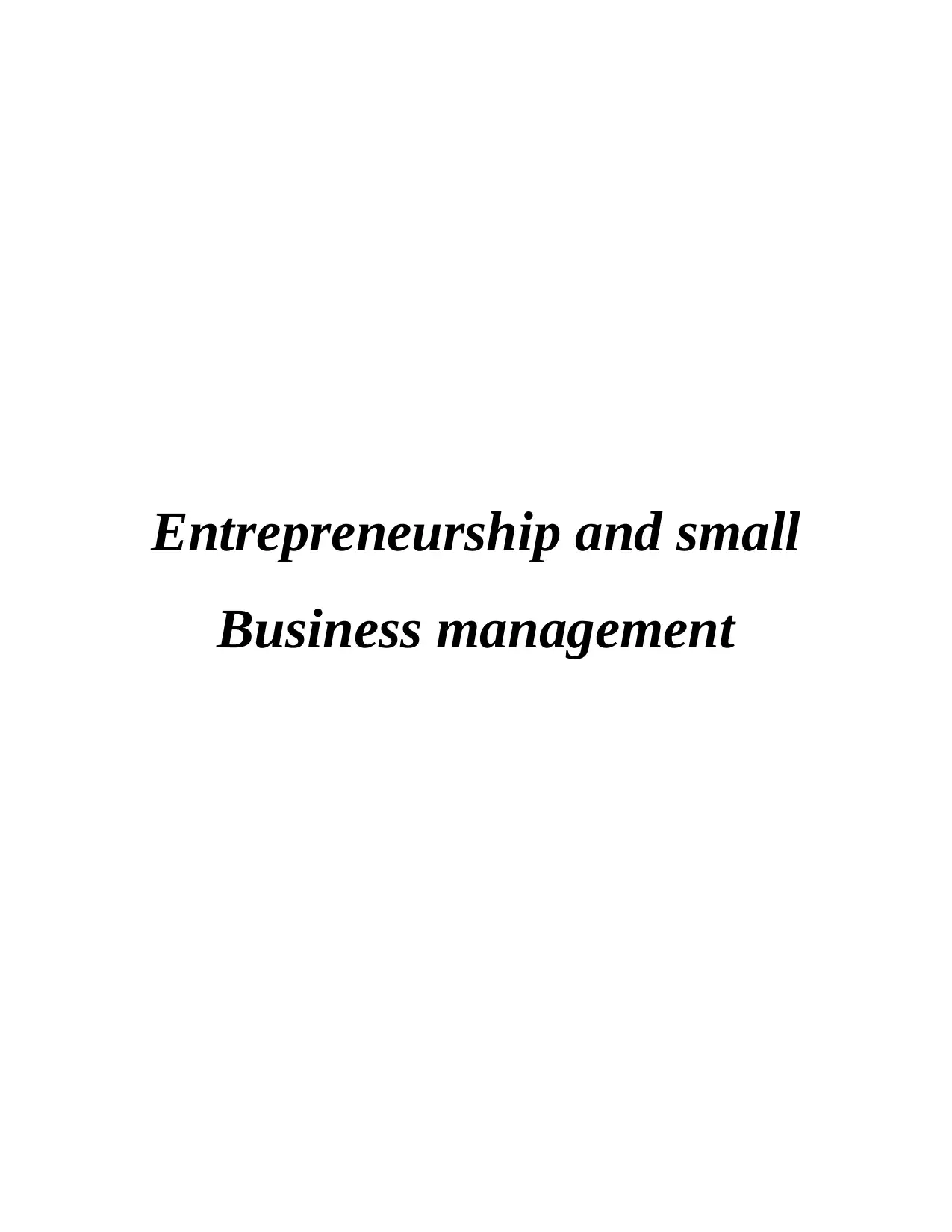
Entrepreneurship and small
Business management
Business management
Paraphrase This Document
Need a fresh take? Get an instant paraphrase of this document with our AI Paraphraser
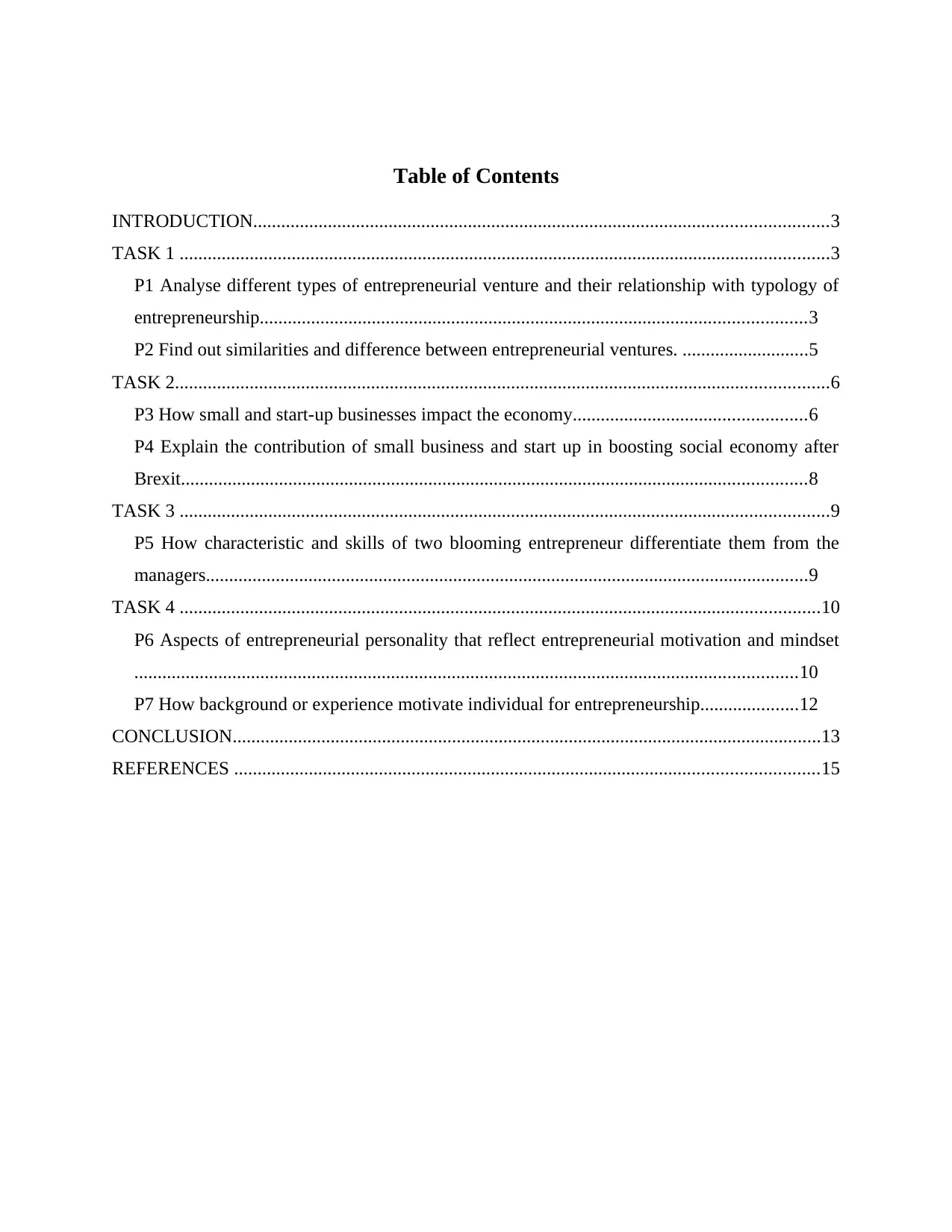
Table of Contents
INTRODUCTION...........................................................................................................................3
TASK 1 ...........................................................................................................................................3
P1 Analyse different types of entrepreneurial venture and their relationship with typology of
entrepreneurship.....................................................................................................................3
P2 Find out similarities and difference between entrepreneurial ventures. ...........................5
TASK 2............................................................................................................................................6
P3 How small and start-up businesses impact the economy..................................................6
P4 Explain the contribution of small business and start up in boosting social economy after
Brexit......................................................................................................................................8
TASK 3 ...........................................................................................................................................9
P5 How characteristic and skills of two blooming entrepreneur differentiate them from the
managers.................................................................................................................................9
TASK 4 .........................................................................................................................................10
P6 Aspects of entrepreneurial personality that reflect entrepreneurial motivation and mindset
..............................................................................................................................................10
P7 How background or experience motivate individual for entrepreneurship.....................12
CONCLUSION..............................................................................................................................13
REFERENCES .............................................................................................................................15
INTRODUCTION...........................................................................................................................3
TASK 1 ...........................................................................................................................................3
P1 Analyse different types of entrepreneurial venture and their relationship with typology of
entrepreneurship.....................................................................................................................3
P2 Find out similarities and difference between entrepreneurial ventures. ...........................5
TASK 2............................................................................................................................................6
P3 How small and start-up businesses impact the economy..................................................6
P4 Explain the contribution of small business and start up in boosting social economy after
Brexit......................................................................................................................................8
TASK 3 ...........................................................................................................................................9
P5 How characteristic and skills of two blooming entrepreneur differentiate them from the
managers.................................................................................................................................9
TASK 4 .........................................................................................................................................10
P6 Aspects of entrepreneurial personality that reflect entrepreneurial motivation and mindset
..............................................................................................................................................10
P7 How background or experience motivate individual for entrepreneurship.....................12
CONCLUSION..............................................................................................................................13
REFERENCES .............................................................................................................................15
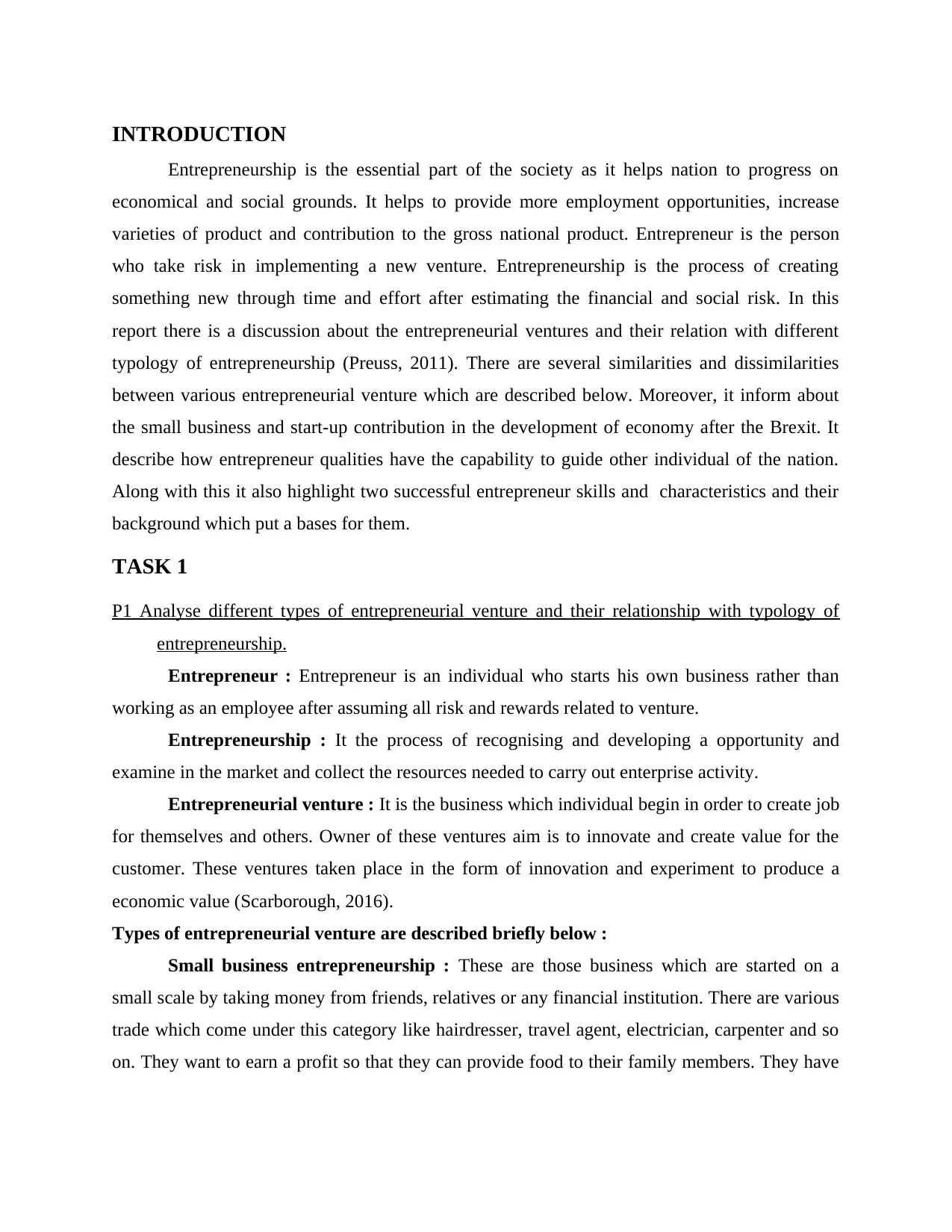
INTRODUCTION
Entrepreneurship is the essential part of the society as it helps nation to progress on
economical and social grounds. It helps to provide more employment opportunities, increase
varieties of product and contribution to the gross national product. Entrepreneur is the person
who take risk in implementing a new venture. Entrepreneurship is the process of creating
something new through time and effort after estimating the financial and social risk. In this
report there is a discussion about the entrepreneurial ventures and their relation with different
typology of entrepreneurship (Preuss, 2011). There are several similarities and dissimilarities
between various entrepreneurial venture which are described below. Moreover, it inform about
the small business and start-up contribution in the development of economy after the Brexit. It
describe how entrepreneur qualities have the capability to guide other individual of the nation.
Along with this it also highlight two successful entrepreneur skills and characteristics and their
background which put a bases for them.
TASK 1
P1 Analyse different types of entrepreneurial venture and their relationship with typology of
entrepreneurship.
Entrepreneur : Entrepreneur is an individual who starts his own business rather than
working as an employee after assuming all risk and rewards related to venture.
Entrepreneurship : It the process of recognising and developing a opportunity and
examine in the market and collect the resources needed to carry out enterprise activity.
Entrepreneurial venture : It is the business which individual begin in order to create job
for themselves and others. Owner of these ventures aim is to innovate and create value for the
customer. These ventures taken place in the form of innovation and experiment to produce a
economic value (Scarborough, 2016).
Types of entrepreneurial venture are described briefly below :
Small business entrepreneurship : These are those business which are started on a
small scale by taking money from friends, relatives or any financial institution. There are various
trade which come under this category like hairdresser, travel agent, electrician, carpenter and so
on. They want to earn a profit so that they can provide food to their family members. They have
Entrepreneurship is the essential part of the society as it helps nation to progress on
economical and social grounds. It helps to provide more employment opportunities, increase
varieties of product and contribution to the gross national product. Entrepreneur is the person
who take risk in implementing a new venture. Entrepreneurship is the process of creating
something new through time and effort after estimating the financial and social risk. In this
report there is a discussion about the entrepreneurial ventures and their relation with different
typology of entrepreneurship (Preuss, 2011). There are several similarities and dissimilarities
between various entrepreneurial venture which are described below. Moreover, it inform about
the small business and start-up contribution in the development of economy after the Brexit. It
describe how entrepreneur qualities have the capability to guide other individual of the nation.
Along with this it also highlight two successful entrepreneur skills and characteristics and their
background which put a bases for them.
TASK 1
P1 Analyse different types of entrepreneurial venture and their relationship with typology of
entrepreneurship.
Entrepreneur : Entrepreneur is an individual who starts his own business rather than
working as an employee after assuming all risk and rewards related to venture.
Entrepreneurship : It the process of recognising and developing a opportunity and
examine in the market and collect the resources needed to carry out enterprise activity.
Entrepreneurial venture : It is the business which individual begin in order to create job
for themselves and others. Owner of these ventures aim is to innovate and create value for the
customer. These ventures taken place in the form of innovation and experiment to produce a
economic value (Scarborough, 2016).
Types of entrepreneurial venture are described briefly below :
Small business entrepreneurship : These are those business which are started on a
small scale by taking money from friends, relatives or any financial institution. There are various
trade which come under this category like hairdresser, travel agent, electrician, carpenter and so
on. They want to earn a profit so that they can provide food to their family members. They have
⊘ This is a preview!⊘
Do you want full access?
Subscribe today to unlock all pages.

Trusted by 1+ million students worldwide
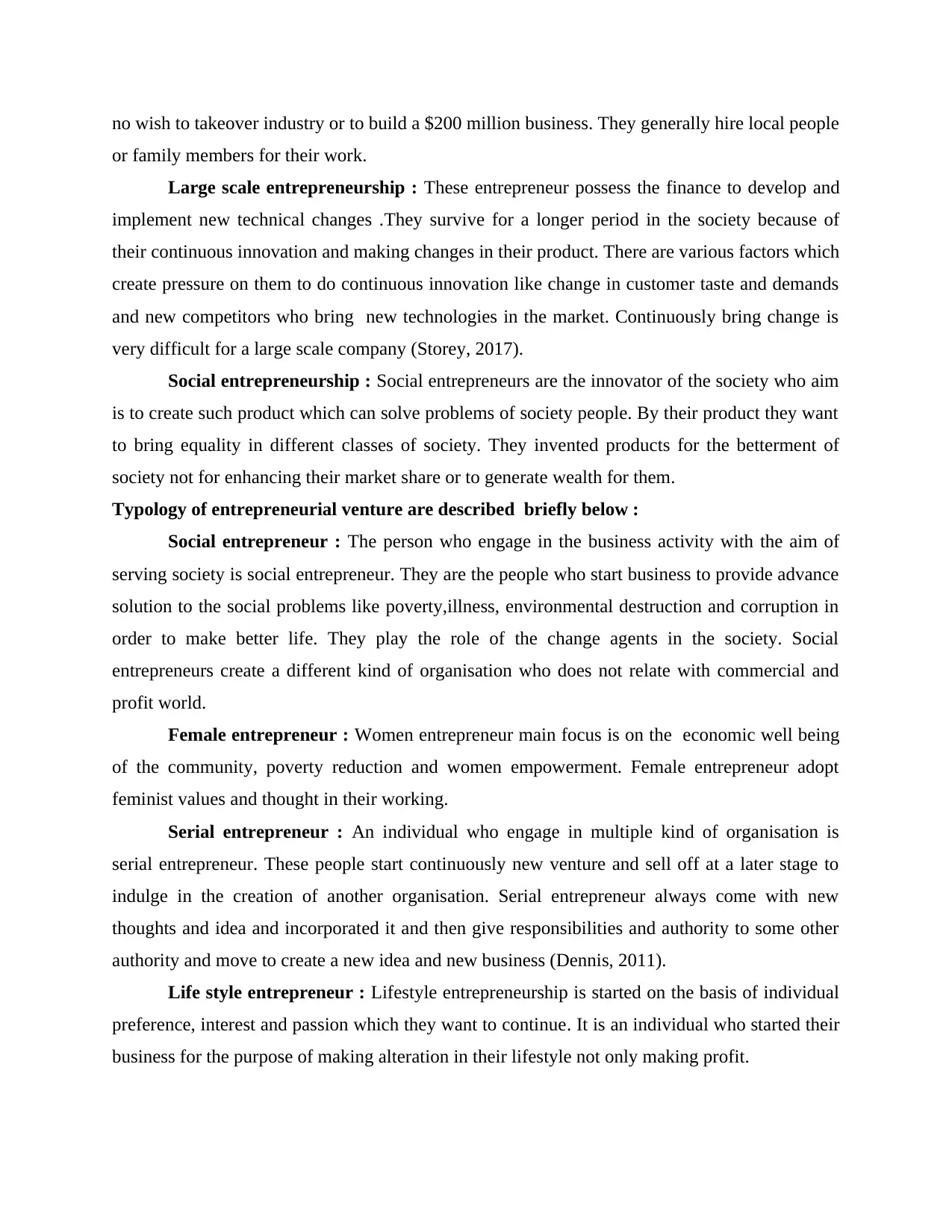
no wish to takeover industry or to build a $200 million business. They generally hire local people
or family members for their work.
Large scale entrepreneurship : These entrepreneur possess the finance to develop and
implement new technical changes .They survive for a longer period in the society because of
their continuous innovation and making changes in their product. There are various factors which
create pressure on them to do continuous innovation like change in customer taste and demands
and new competitors who bring new technologies in the market. Continuously bring change is
very difficult for a large scale company (Storey, 2017).
Social entrepreneurship : Social entrepreneurs are the innovator of the society who aim
is to create such product which can solve problems of society people. By their product they want
to bring equality in different classes of society. They invented products for the betterment of
society not for enhancing their market share or to generate wealth for them.
Typology of entrepreneurial venture are described briefly below :
Social entrepreneur : The person who engage in the business activity with the aim of
serving society is social entrepreneur. They are the people who start business to provide advance
solution to the social problems like poverty,illness, environmental destruction and corruption in
order to make better life. They play the role of the change agents in the society. Social
entrepreneurs create a different kind of organisation who does not relate with commercial and
profit world.
Female entrepreneur : Women entrepreneur main focus is on the economic well being
of the community, poverty reduction and women empowerment. Female entrepreneur adopt
feminist values and thought in their working.
Serial entrepreneur : An individual who engage in multiple kind of organisation is
serial entrepreneur. These people start continuously new venture and sell off at a later stage to
indulge in the creation of another organisation. Serial entrepreneur always come with new
thoughts and idea and incorporated it and then give responsibilities and authority to some other
authority and move to create a new idea and new business (Dennis, 2011).
Life style entrepreneur : Lifestyle entrepreneurship is started on the basis of individual
preference, interest and passion which they want to continue. It is an individual who started their
business for the purpose of making alteration in their lifestyle not only making profit.
or family members for their work.
Large scale entrepreneurship : These entrepreneur possess the finance to develop and
implement new technical changes .They survive for a longer period in the society because of
their continuous innovation and making changes in their product. There are various factors which
create pressure on them to do continuous innovation like change in customer taste and demands
and new competitors who bring new technologies in the market. Continuously bring change is
very difficult for a large scale company (Storey, 2017).
Social entrepreneurship : Social entrepreneurs are the innovator of the society who aim
is to create such product which can solve problems of society people. By their product they want
to bring equality in different classes of society. They invented products for the betterment of
society not for enhancing their market share or to generate wealth for them.
Typology of entrepreneurial venture are described briefly below :
Social entrepreneur : The person who engage in the business activity with the aim of
serving society is social entrepreneur. They are the people who start business to provide advance
solution to the social problems like poverty,illness, environmental destruction and corruption in
order to make better life. They play the role of the change agents in the society. Social
entrepreneurs create a different kind of organisation who does not relate with commercial and
profit world.
Female entrepreneur : Women entrepreneur main focus is on the economic well being
of the community, poverty reduction and women empowerment. Female entrepreneur adopt
feminist values and thought in their working.
Serial entrepreneur : An individual who engage in multiple kind of organisation is
serial entrepreneur. These people start continuously new venture and sell off at a later stage to
indulge in the creation of another organisation. Serial entrepreneur always come with new
thoughts and idea and incorporated it and then give responsibilities and authority to some other
authority and move to create a new idea and new business (Dennis, 2011).
Life style entrepreneur : Lifestyle entrepreneurship is started on the basis of individual
preference, interest and passion which they want to continue. It is an individual who started their
business for the purpose of making alteration in their lifestyle not only making profit.
Paraphrase This Document
Need a fresh take? Get an instant paraphrase of this document with our AI Paraphraser
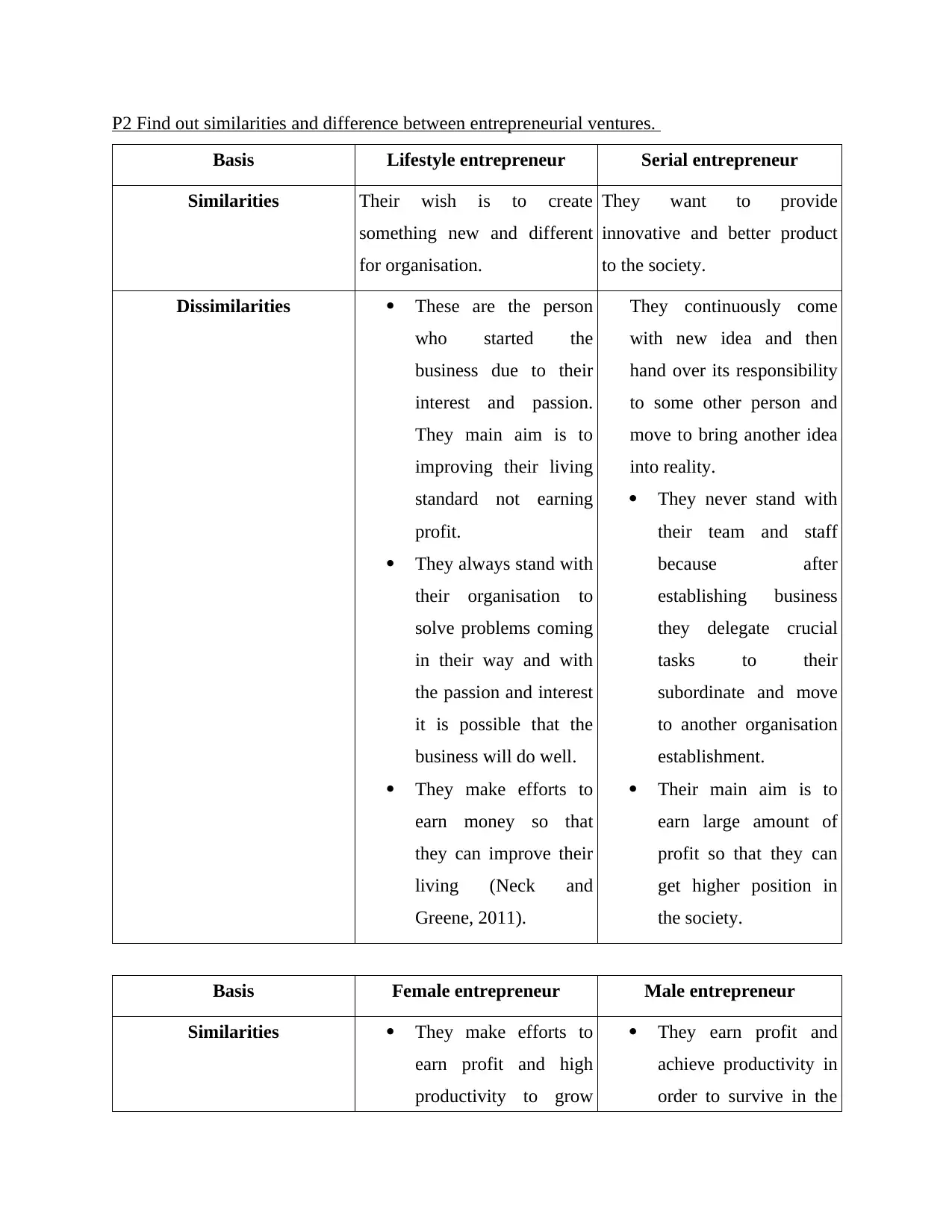
P2 Find out similarities and difference between entrepreneurial ventures.
Basis Lifestyle entrepreneur Serial entrepreneur
Similarities Their wish is to create
something new and different
for organisation.
They want to provide
innovative and better product
to the society.
Dissimilarities These are the person
who started the
business due to their
interest and passion.
They main aim is to
improving their living
standard not earning
profit.
They always stand with
their organisation to
solve problems coming
in their way and with
the passion and interest
it is possible that the
business will do well.
They make efforts to
earn money so that
they can improve their
living (Neck and
Greene, 2011).
They continuously come
with new idea and then
hand over its responsibility
to some other person and
move to bring another idea
into reality.
They never stand with
their team and staff
because after
establishing business
they delegate crucial
tasks to their
subordinate and move
to another organisation
establishment.
Their main aim is to
earn large amount of
profit so that they can
get higher position in
the society.
Basis Female entrepreneur Male entrepreneur
Similarities They make efforts to
earn profit and high
productivity to grow
They earn profit and
achieve productivity in
order to survive in the
Basis Lifestyle entrepreneur Serial entrepreneur
Similarities Their wish is to create
something new and different
for organisation.
They want to provide
innovative and better product
to the society.
Dissimilarities These are the person
who started the
business due to their
interest and passion.
They main aim is to
improving their living
standard not earning
profit.
They always stand with
their organisation to
solve problems coming
in their way and with
the passion and interest
it is possible that the
business will do well.
They make efforts to
earn money so that
they can improve their
living (Neck and
Greene, 2011).
They continuously come
with new idea and then
hand over its responsibility
to some other person and
move to bring another idea
into reality.
They never stand with
their team and staff
because after
establishing business
they delegate crucial
tasks to their
subordinate and move
to another organisation
establishment.
Their main aim is to
earn large amount of
profit so that they can
get higher position in
the society.
Basis Female entrepreneur Male entrepreneur
Similarities They make efforts to
earn profit and high
productivity to grow
They earn profit and
achieve productivity in
order to survive in the
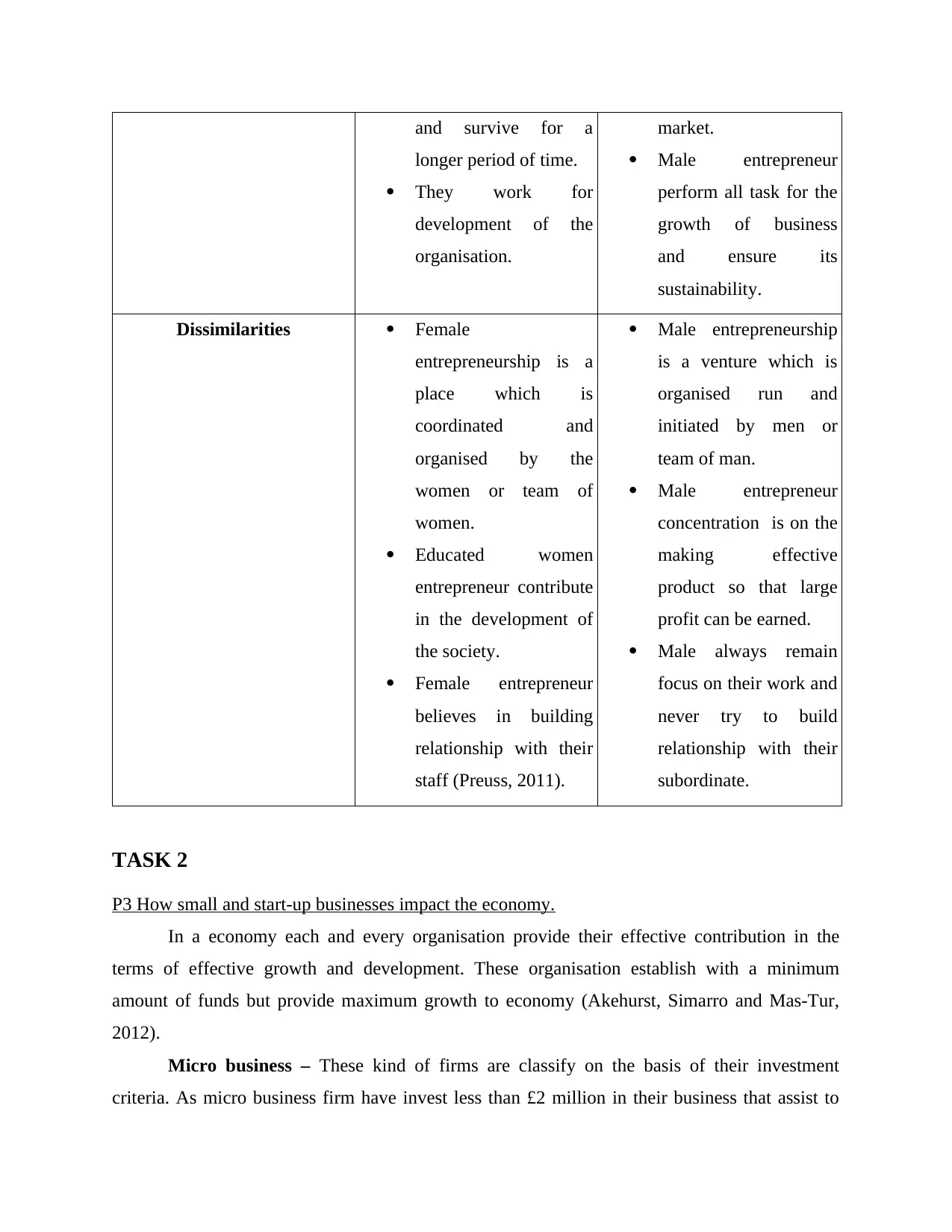
and survive for a
longer period of time.
They work for
development of the
organisation.
market.
Male entrepreneur
perform all task for the
growth of business
and ensure its
sustainability.
Dissimilarities Female
entrepreneurship is a
place which is
coordinated and
organised by the
women or team of
women.
Educated women
entrepreneur contribute
in the development of
the society.
Female entrepreneur
believes in building
relationship with their
staff (Preuss, 2011).
Male entrepreneurship
is a venture which is
organised run and
initiated by men or
team of man.
Male entrepreneur
concentration is on the
making effective
product so that large
profit can be earned.
Male always remain
focus on their work and
never try to build
relationship with their
subordinate.
TASK 2
P3 How small and start-up businesses impact the economy.
In a economy each and every organisation provide their effective contribution in the
terms of effective growth and development. These organisation establish with a minimum
amount of funds but provide maximum growth to economy (Akehurst, Simarro and Mas‐Tur,
2012).
Micro business – These kind of firms are classify on the basis of their investment
criteria. As micro business firm have invest less than £2 million in their business that assist to
longer period of time.
They work for
development of the
organisation.
market.
Male entrepreneur
perform all task for the
growth of business
and ensure its
sustainability.
Dissimilarities Female
entrepreneurship is a
place which is
coordinated and
organised by the
women or team of
women.
Educated women
entrepreneur contribute
in the development of
the society.
Female entrepreneur
believes in building
relationship with their
staff (Preuss, 2011).
Male entrepreneurship
is a venture which is
organised run and
initiated by men or
team of man.
Male entrepreneur
concentration is on the
making effective
product so that large
profit can be earned.
Male always remain
focus on their work and
never try to build
relationship with their
subordinate.
TASK 2
P3 How small and start-up businesses impact the economy.
In a economy each and every organisation provide their effective contribution in the
terms of effective growth and development. These organisation establish with a minimum
amount of funds but provide maximum growth to economy (Akehurst, Simarro and Mas‐Tur,
2012).
Micro business – These kind of firms are classify on the basis of their investment
criteria. As micro business firm have invest less than £2 million in their business that assist to
⊘ This is a preview!⊘
Do you want full access?
Subscribe today to unlock all pages.

Trusted by 1+ million students worldwide
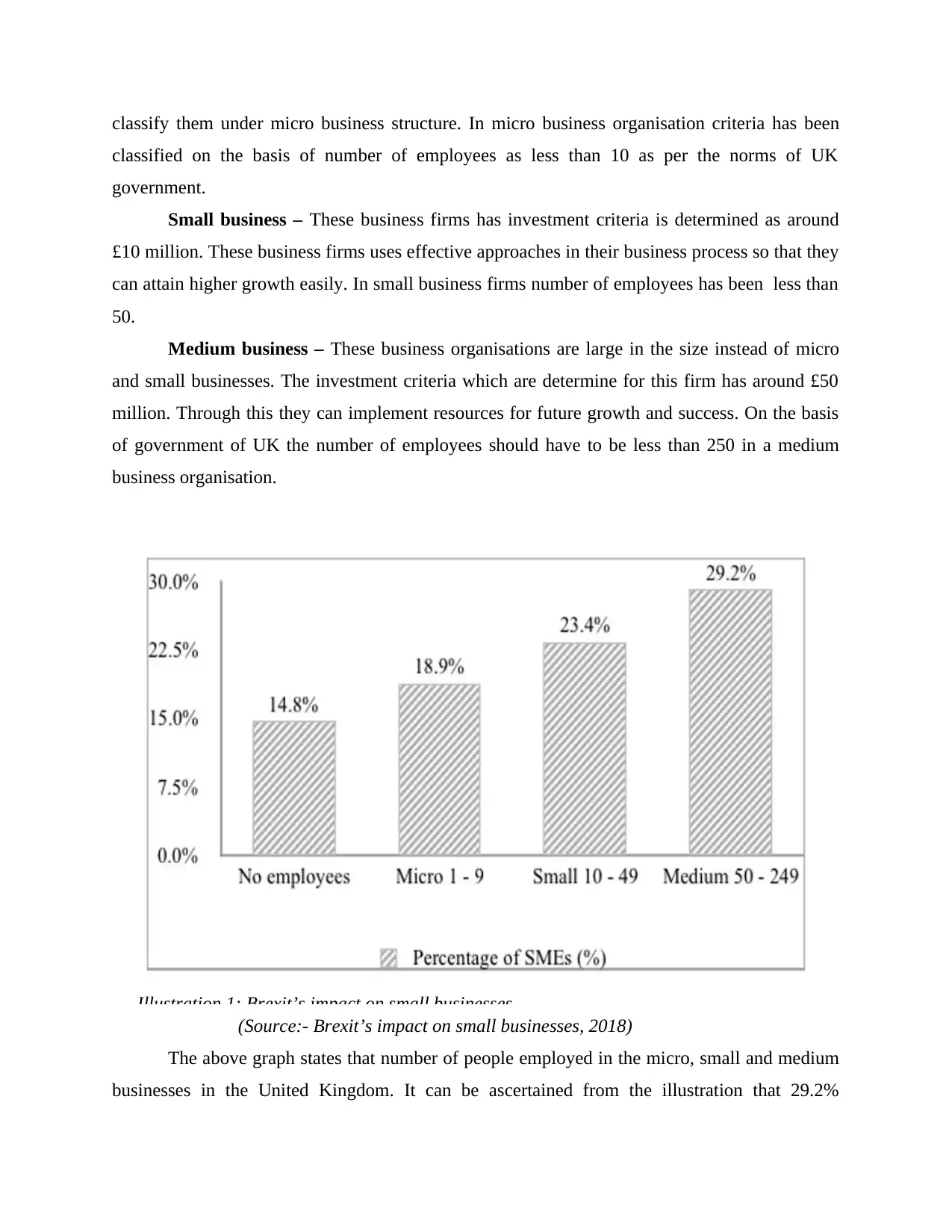
classify them under micro business structure. In micro business organisation criteria has been
classified on the basis of number of employees as less than 10 as per the norms of UK
government.
Small business – These business firms has investment criteria is determined as around
£10 million. These business firms uses effective approaches in their business process so that they
can attain higher growth easily. In small business firms number of employees has been less than
50.
Medium business – These business organisations are large in the size instead of micro
and small businesses. The investment criteria which are determine for this firm has around £50
million. Through this they can implement resources for future growth and success. On the basis
of government of UK the number of employees should have to be less than 250 in a medium
business organisation.
(Source:- Brexit’s impact on small businesses, 2018)
The above graph states that number of people employed in the micro, small and medium
businesses in the United Kingdom. It can be ascertained from the illustration that 29.2%
Illustration 1: Brexit’s impact on small businesses
classified on the basis of number of employees as less than 10 as per the norms of UK
government.
Small business – These business firms has investment criteria is determined as around
£10 million. These business firms uses effective approaches in their business process so that they
can attain higher growth easily. In small business firms number of employees has been less than
50.
Medium business – These business organisations are large in the size instead of micro
and small businesses. The investment criteria which are determine for this firm has around £50
million. Through this they can implement resources for future growth and success. On the basis
of government of UK the number of employees should have to be less than 250 in a medium
business organisation.
(Source:- Brexit’s impact on small businesses, 2018)
The above graph states that number of people employed in the micro, small and medium
businesses in the United Kingdom. It can be ascertained from the illustration that 29.2%
Illustration 1: Brexit’s impact on small businesses
Paraphrase This Document
Need a fresh take? Get an instant paraphrase of this document with our AI Paraphraser
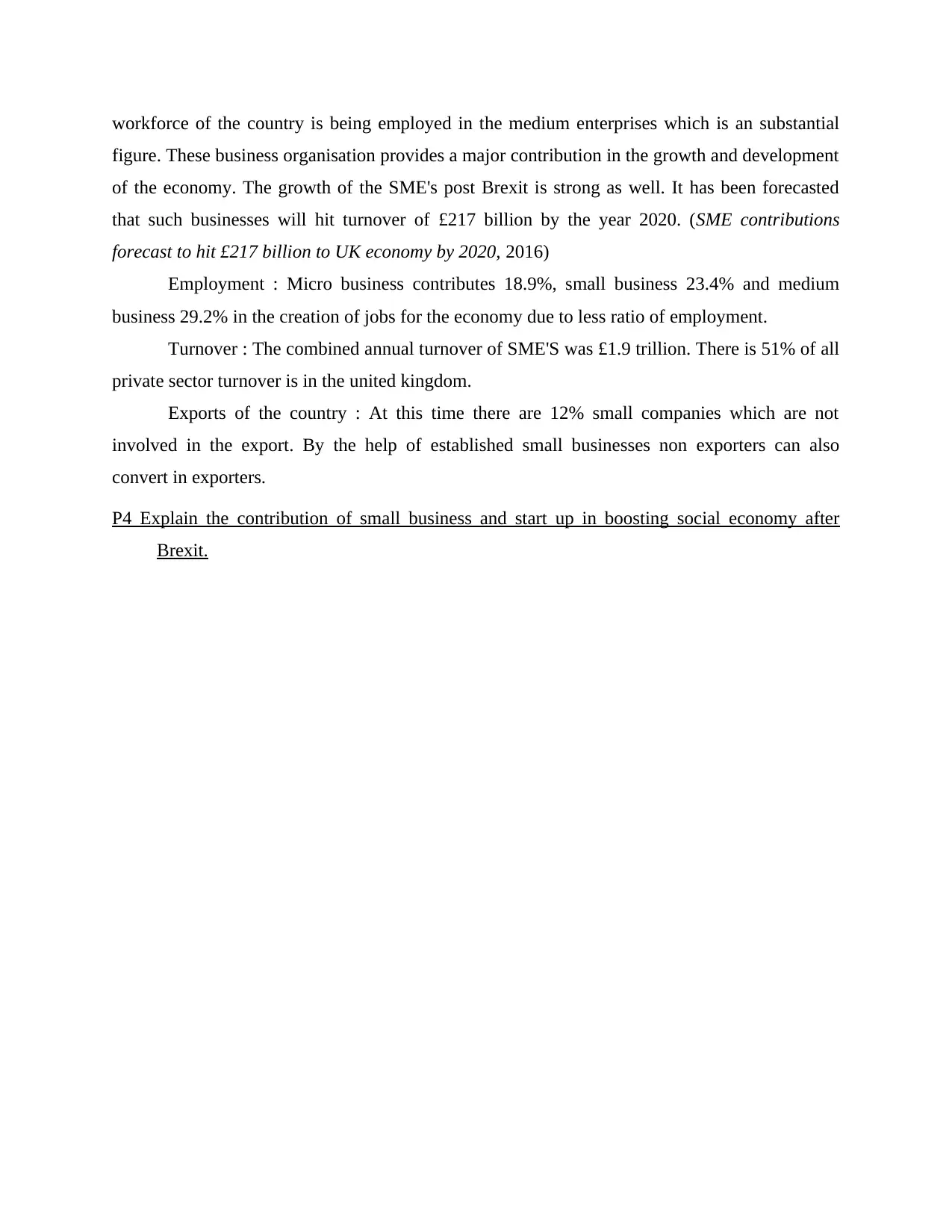
workforce of the country is being employed in the medium enterprises which is an substantial
figure. These business organisation provides a major contribution in the growth and development
of the economy. The growth of the SME's post Brexit is strong as well. It has been forecasted
that such businesses will hit turnover of £217 billion by the year 2020. (SME contributions
forecast to hit £217 billion to UK economy by 2020, 2016)
Employment : Micro business contributes 18.9%, small business 23.4% and medium
business 29.2% in the creation of jobs for the economy due to less ratio of employment.
Turnover : The combined annual turnover of SME'S was £1.9 trillion. There is 51% of all
private sector turnover is in the united kingdom.
Exports of the country : At this time there are 12% small companies which are not
involved in the export. By the help of established small businesses non exporters can also
convert in exporters.
P4 Explain the contribution of small business and start up in boosting social economy after
Brexit.
figure. These business organisation provides a major contribution in the growth and development
of the economy. The growth of the SME's post Brexit is strong as well. It has been forecasted
that such businesses will hit turnover of £217 billion by the year 2020. (SME contributions
forecast to hit £217 billion to UK economy by 2020, 2016)
Employment : Micro business contributes 18.9%, small business 23.4% and medium
business 29.2% in the creation of jobs for the economy due to less ratio of employment.
Turnover : The combined annual turnover of SME'S was £1.9 trillion. There is 51% of all
private sector turnover is in the united kingdom.
Exports of the country : At this time there are 12% small companies which are not
involved in the export. By the help of established small businesses non exporters can also
convert in exporters.
P4 Explain the contribution of small business and start up in boosting social economy after
Brexit.
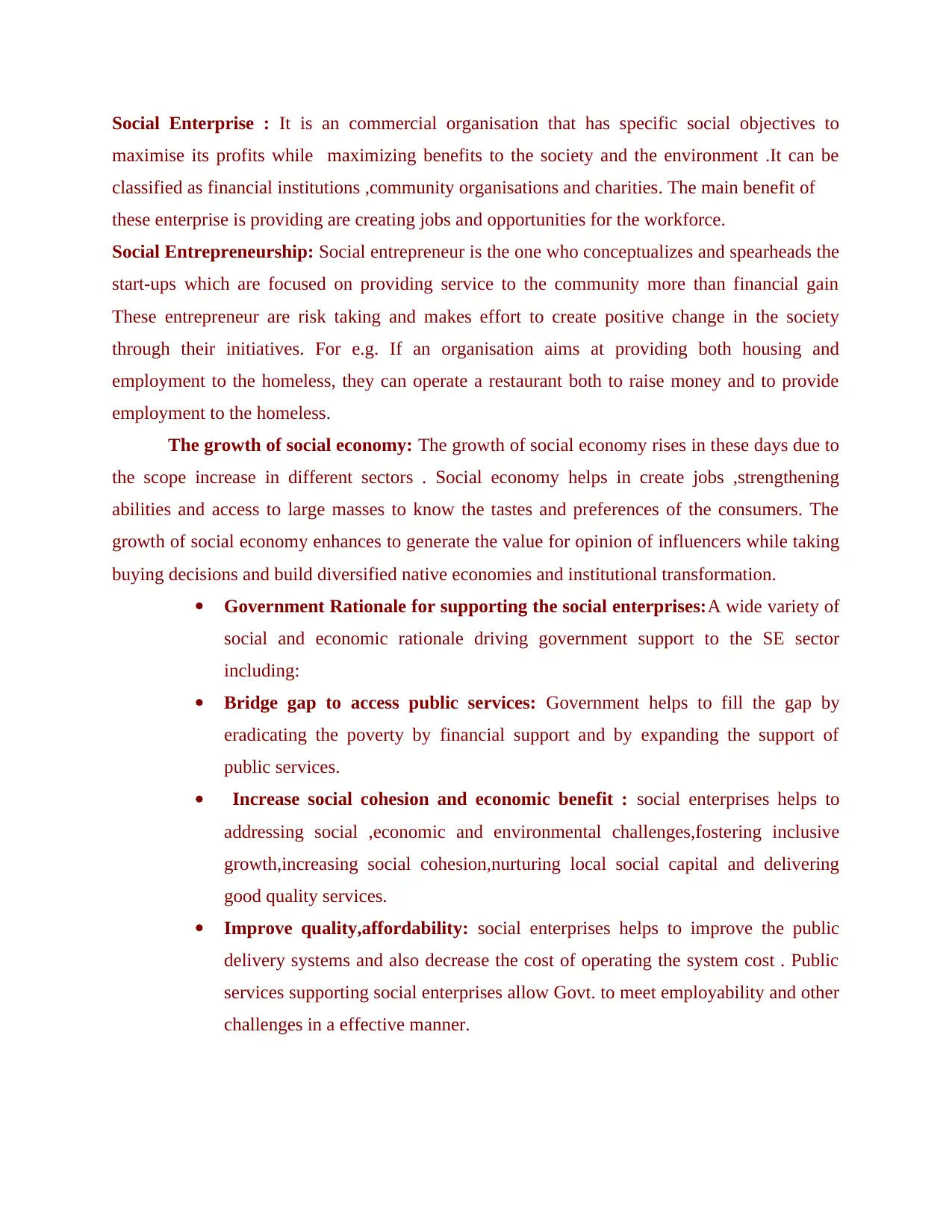
Social Enterprise : It is an commercial organisation that has specific social objectives to
maximise its profits while maximizing benefits to the society and the environment .It can be
classified as financial institutions ,community organisations and charities. The main benefit of
these enterprise is providing are creating jobs and opportunities for the workforce.
Social Entrepreneurship: Social entrepreneur is the one who conceptualizes and spearheads the
start-ups which are focused on providing service to the community more than financial gain
These entrepreneur are risk taking and makes effort to create positive change in the society
through their initiatives. For e.g. If an organisation aims at providing both housing and
employment to the homeless, they can operate a restaurant both to raise money and to provide
employment to the homeless.
The growth of social economy: The growth of social economy rises in these days due to
the scope increase in different sectors . Social economy helps in create jobs ,strengthening
abilities and access to large masses to know the tastes and preferences of the consumers. The
growth of social economy enhances to generate the value for opinion of influencers while taking
buying decisions and build diversified native economies and institutional transformation.
Government Rationale for supporting the social enterprises:A wide variety of
social and economic rationale driving government support to the SE sector
including:
Bridge gap to access public services: Government helps to fill the gap by
eradicating the poverty by financial support and by expanding the support of
public services.
Increase social cohesion and economic benefit : social enterprises helps to
addressing social ,economic and environmental challenges,fostering inclusive
growth,increasing social cohesion,nurturing local social capital and delivering
good quality services.
Improve quality,affordability: social enterprises helps to improve the public
delivery systems and also decrease the cost of operating the system cost . Public
services supporting social enterprises allow Govt. to meet employability and other
challenges in a effective manner.
maximise its profits while maximizing benefits to the society and the environment .It can be
classified as financial institutions ,community organisations and charities. The main benefit of
these enterprise is providing are creating jobs and opportunities for the workforce.
Social Entrepreneurship: Social entrepreneur is the one who conceptualizes and spearheads the
start-ups which are focused on providing service to the community more than financial gain
These entrepreneur are risk taking and makes effort to create positive change in the society
through their initiatives. For e.g. If an organisation aims at providing both housing and
employment to the homeless, they can operate a restaurant both to raise money and to provide
employment to the homeless.
The growth of social economy: The growth of social economy rises in these days due to
the scope increase in different sectors . Social economy helps in create jobs ,strengthening
abilities and access to large masses to know the tastes and preferences of the consumers. The
growth of social economy enhances to generate the value for opinion of influencers while taking
buying decisions and build diversified native economies and institutional transformation.
Government Rationale for supporting the social enterprises:A wide variety of
social and economic rationale driving government support to the SE sector
including:
Bridge gap to access public services: Government helps to fill the gap by
eradicating the poverty by financial support and by expanding the support of
public services.
Increase social cohesion and economic benefit : social enterprises helps to
addressing social ,economic and environmental challenges,fostering inclusive
growth,increasing social cohesion,nurturing local social capital and delivering
good quality services.
Improve quality,affordability: social enterprises helps to improve the public
delivery systems and also decrease the cost of operating the system cost . Public
services supporting social enterprises allow Govt. to meet employability and other
challenges in a effective manner.
⊘ This is a preview!⊘
Do you want full access?
Subscribe today to unlock all pages.

Trusted by 1+ million students worldwide
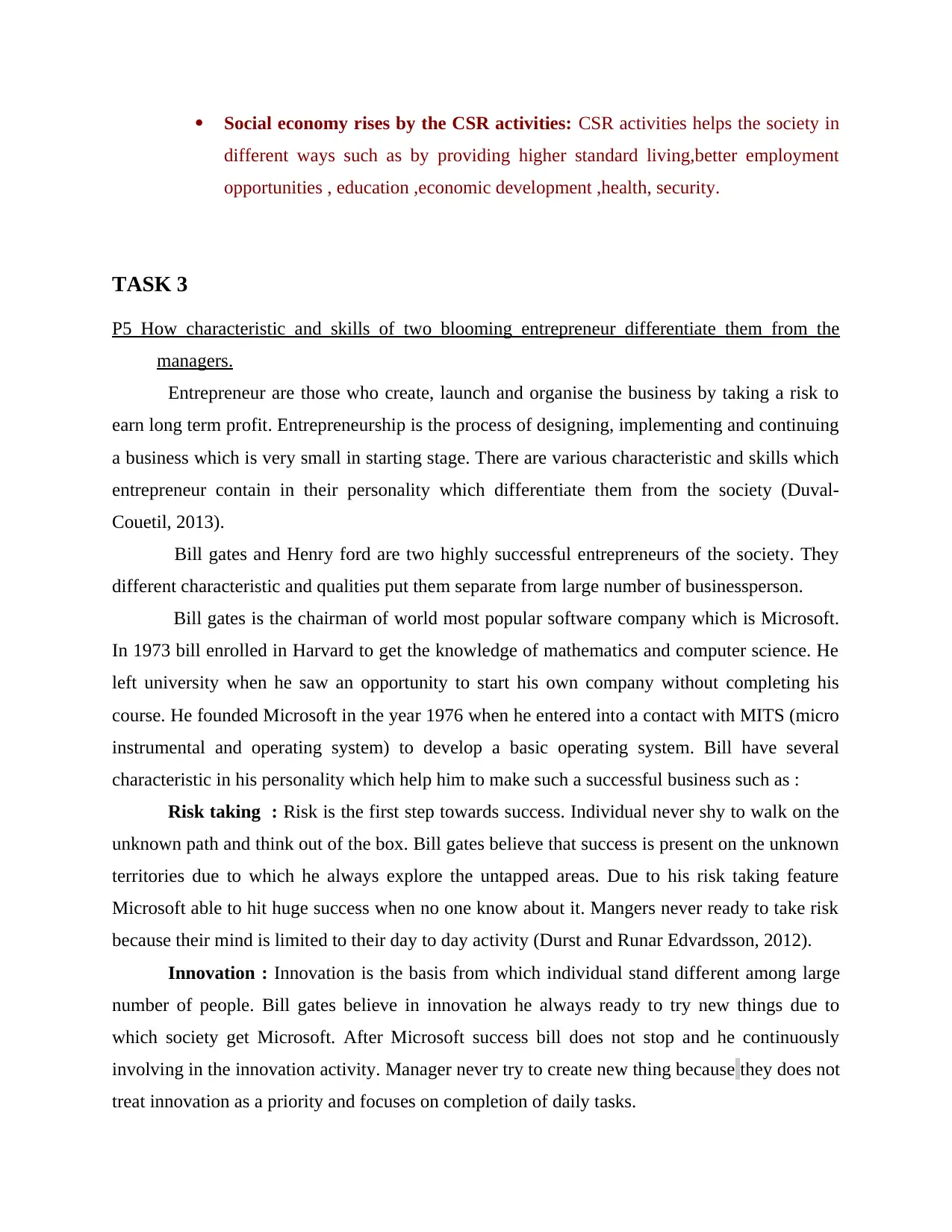
Social economy rises by the CSR activities: CSR activities helps the society in
different ways such as by providing higher standard living,better employment
opportunities , education ,economic development ,health, security.
TASK 3
P5 How characteristic and skills of two blooming entrepreneur differentiate them from the
managers.
Entrepreneur are those who create, launch and organise the business by taking a risk to
earn long term profit. Entrepreneurship is the process of designing, implementing and continuing
a business which is very small in starting stage. There are various characteristic and skills which
entrepreneur contain in their personality which differentiate them from the society (Duval‐
Couetil, 2013).
Bill gates and Henry ford are two highly successful entrepreneurs of the society. They
different characteristic and qualities put them separate from large number of businessperson.
Bill gates is the chairman of world most popular software company which is Microsoft.
In 1973 bill enrolled in Harvard to get the knowledge of mathematics and computer science. He
left university when he saw an opportunity to start his own company without completing his
course. He founded Microsoft in the year 1976 when he entered into a contact with MITS (micro
instrumental and operating system) to develop a basic operating system. Bill have several
characteristic in his personality which help him to make such a successful business such as :
Risk taking : Risk is the first step towards success. Individual never shy to walk on the
unknown path and think out of the box. Bill gates believe that success is present on the unknown
territories due to which he always explore the untapped areas. Due to his risk taking feature
Microsoft able to hit huge success when no one know about it. Mangers never ready to take risk
because their mind is limited to their day to day activity (Durst and Runar Edvardsson, 2012).
Innovation : Innovation is the basis from which individual stand different among large
number of people. Bill gates believe in innovation he always ready to try new things due to
which society get Microsoft. After Microsoft success bill does not stop and he continuously
involving in the innovation activity. Manager never try to create new thing because they does not
treat innovation as a priority and focuses on completion of daily tasks.
different ways such as by providing higher standard living,better employment
opportunities , education ,economic development ,health, security.
TASK 3
P5 How characteristic and skills of two blooming entrepreneur differentiate them from the
managers.
Entrepreneur are those who create, launch and organise the business by taking a risk to
earn long term profit. Entrepreneurship is the process of designing, implementing and continuing
a business which is very small in starting stage. There are various characteristic and skills which
entrepreneur contain in their personality which differentiate them from the society (Duval‐
Couetil, 2013).
Bill gates and Henry ford are two highly successful entrepreneurs of the society. They
different characteristic and qualities put them separate from large number of businessperson.
Bill gates is the chairman of world most popular software company which is Microsoft.
In 1973 bill enrolled in Harvard to get the knowledge of mathematics and computer science. He
left university when he saw an opportunity to start his own company without completing his
course. He founded Microsoft in the year 1976 when he entered into a contact with MITS (micro
instrumental and operating system) to develop a basic operating system. Bill have several
characteristic in his personality which help him to make such a successful business such as :
Risk taking : Risk is the first step towards success. Individual never shy to walk on the
unknown path and think out of the box. Bill gates believe that success is present on the unknown
territories due to which he always explore the untapped areas. Due to his risk taking feature
Microsoft able to hit huge success when no one know about it. Mangers never ready to take risk
because their mind is limited to their day to day activity (Durst and Runar Edvardsson, 2012).
Innovation : Innovation is the basis from which individual stand different among large
number of people. Bill gates believe in innovation he always ready to try new things due to
which society get Microsoft. After Microsoft success bill does not stop and he continuously
involving in the innovation activity. Manager never try to create new thing because they does not
treat innovation as a priority and focuses on completion of daily tasks.
Paraphrase This Document
Need a fresh take? Get an instant paraphrase of this document with our AI Paraphraser
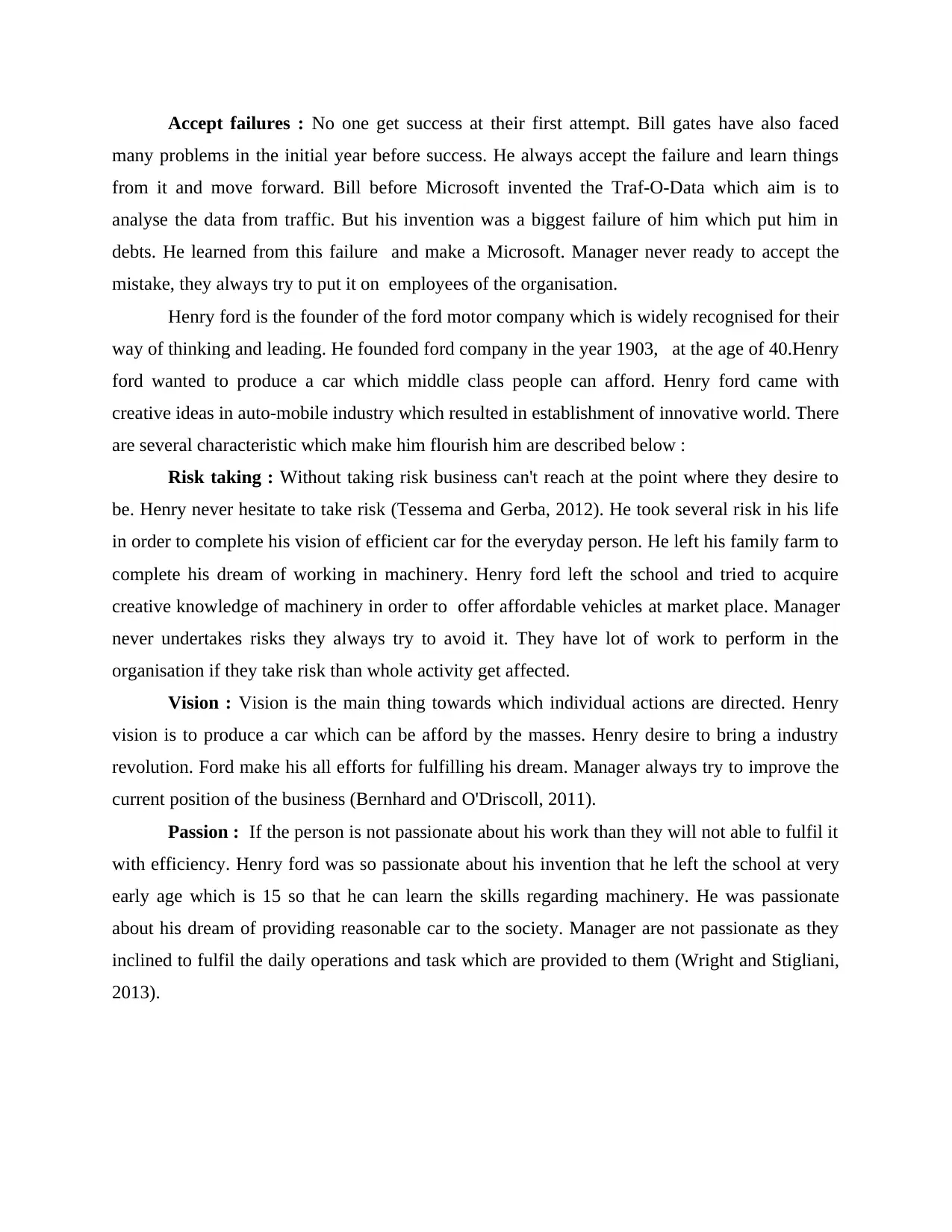
Accept failures : No one get success at their first attempt. Bill gates have also faced
many problems in the initial year before success. He always accept the failure and learn things
from it and move forward. Bill before Microsoft invented the Traf-O-Data which aim is to
analyse the data from traffic. But his invention was a biggest failure of him which put him in
debts. He learned from this failure and make a Microsoft. Manager never ready to accept the
mistake, they always try to put it on employees of the organisation.
Henry ford is the founder of the ford motor company which is widely recognised for their
way of thinking and leading. He founded ford company in the year 1903, at the age of 40.Henry
ford wanted to produce a car which middle class people can afford. Henry ford came with
creative ideas in auto-mobile industry which resulted in establishment of innovative world. There
are several characteristic which make him flourish him are described below :
Risk taking : Without taking risk business can't reach at the point where they desire to
be. Henry never hesitate to take risk (Tessema and Gerba, 2012). He took several risk in his life
in order to complete his vision of efficient car for the everyday person. He left his family farm to
complete his dream of working in machinery. Henry ford left the school and tried to acquire
creative knowledge of machinery in order to offer affordable vehicles at market place. Manager
never undertakes risks they always try to avoid it. They have lot of work to perform in the
organisation if they take risk than whole activity get affected.
Vision : Vision is the main thing towards which individual actions are directed. Henry
vision is to produce a car which can be afford by the masses. Henry desire to bring a industry
revolution. Ford make his all efforts for fulfilling his dream. Manager always try to improve the
current position of the business (Bernhard and O'Driscoll, 2011).
Passion : If the person is not passionate about his work than they will not able to fulfil it
with efficiency. Henry ford was so passionate about his invention that he left the school at very
early age which is 15 so that he can learn the skills regarding machinery. He was passionate
about his dream of providing reasonable car to the society. Manager are not passionate as they
inclined to fulfil the daily operations and task which are provided to them (Wright and Stigliani,
2013).
many problems in the initial year before success. He always accept the failure and learn things
from it and move forward. Bill before Microsoft invented the Traf-O-Data which aim is to
analyse the data from traffic. But his invention was a biggest failure of him which put him in
debts. He learned from this failure and make a Microsoft. Manager never ready to accept the
mistake, they always try to put it on employees of the organisation.
Henry ford is the founder of the ford motor company which is widely recognised for their
way of thinking and leading. He founded ford company in the year 1903, at the age of 40.Henry
ford wanted to produce a car which middle class people can afford. Henry ford came with
creative ideas in auto-mobile industry which resulted in establishment of innovative world. There
are several characteristic which make him flourish him are described below :
Risk taking : Without taking risk business can't reach at the point where they desire to
be. Henry never hesitate to take risk (Tessema and Gerba, 2012). He took several risk in his life
in order to complete his vision of efficient car for the everyday person. He left his family farm to
complete his dream of working in machinery. Henry ford left the school and tried to acquire
creative knowledge of machinery in order to offer affordable vehicles at market place. Manager
never undertakes risks they always try to avoid it. They have lot of work to perform in the
organisation if they take risk than whole activity get affected.
Vision : Vision is the main thing towards which individual actions are directed. Henry
vision is to produce a car which can be afford by the masses. Henry desire to bring a industry
revolution. Ford make his all efforts for fulfilling his dream. Manager always try to improve the
current position of the business (Bernhard and O'Driscoll, 2011).
Passion : If the person is not passionate about his work than they will not able to fulfil it
with efficiency. Henry ford was so passionate about his invention that he left the school at very
early age which is 15 so that he can learn the skills regarding machinery. He was passionate
about his dream of providing reasonable car to the society. Manager are not passionate as they
inclined to fulfil the daily operations and task which are provided to them (Wright and Stigliani,
2013).
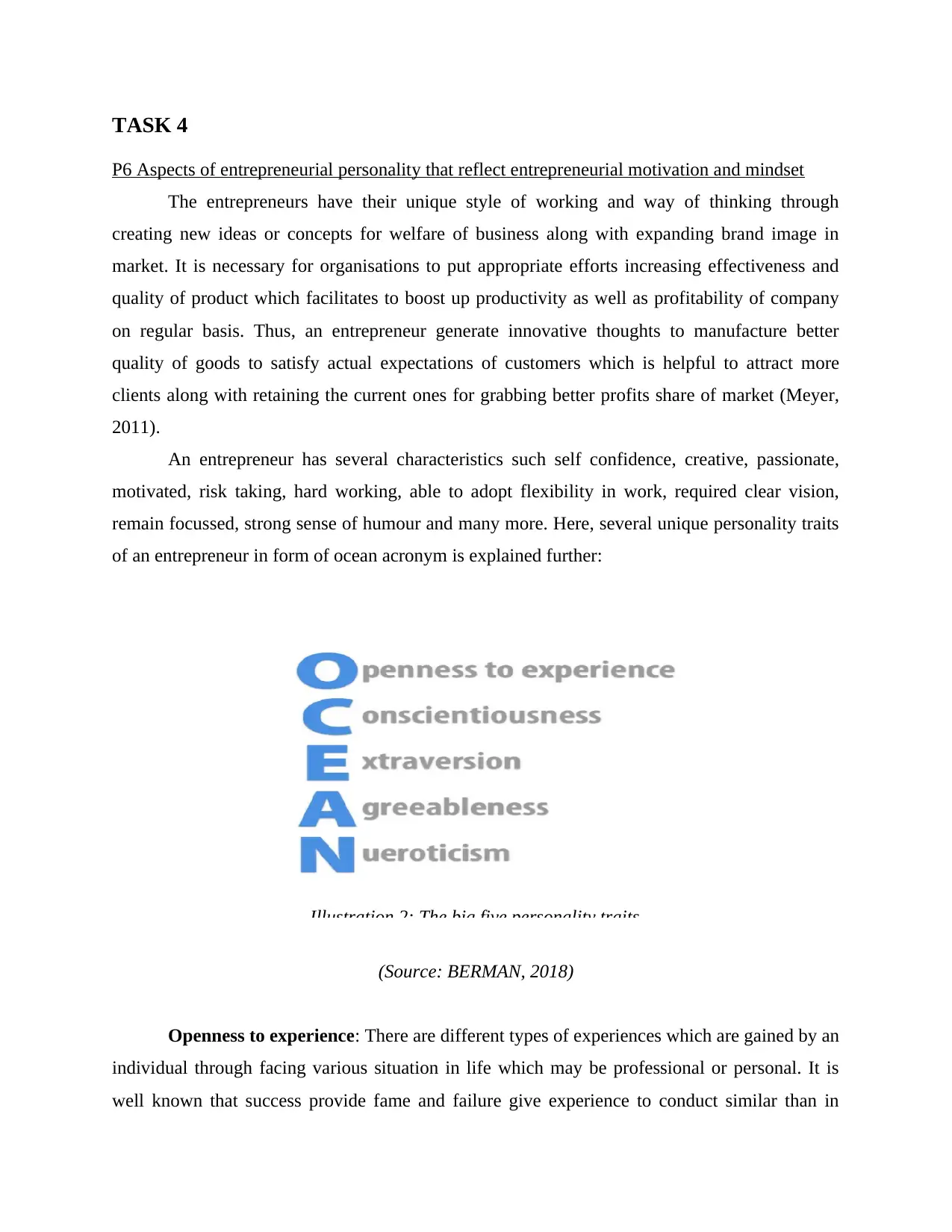
TASK 4
P6 Aspects of entrepreneurial personality that reflect entrepreneurial motivation and mindset
The entrepreneurs have their unique style of working and way of thinking through
creating new ideas or concepts for welfare of business along with expanding brand image in
market. It is necessary for organisations to put appropriate efforts increasing effectiveness and
quality of product which facilitates to boost up productivity as well as profitability of company
on regular basis. Thus, an entrepreneur generate innovative thoughts to manufacture better
quality of goods to satisfy actual expectations of customers which is helpful to attract more
clients along with retaining the current ones for grabbing better profits share of market (Meyer,
2011).
An entrepreneur has several characteristics such self confidence, creative, passionate,
motivated, risk taking, hard working, able to adopt flexibility in work, required clear vision,
remain focussed, strong sense of humour and many more. Here, several unique personality traits
of an entrepreneur in form of ocean acronym is explained further:
(Source: BERMAN, 2018)
Openness to experience: There are different types of experiences which are gained by an
individual through facing various situation in life which may be professional or personal. It is
well known that success provide fame and failure give experience to conduct similar than in
Illustration 2: The big five personality traits
P6 Aspects of entrepreneurial personality that reflect entrepreneurial motivation and mindset
The entrepreneurs have their unique style of working and way of thinking through
creating new ideas or concepts for welfare of business along with expanding brand image in
market. It is necessary for organisations to put appropriate efforts increasing effectiveness and
quality of product which facilitates to boost up productivity as well as profitability of company
on regular basis. Thus, an entrepreneur generate innovative thoughts to manufacture better
quality of goods to satisfy actual expectations of customers which is helpful to attract more
clients along with retaining the current ones for grabbing better profits share of market (Meyer,
2011).
An entrepreneur has several characteristics such self confidence, creative, passionate,
motivated, risk taking, hard working, able to adopt flexibility in work, required clear vision,
remain focussed, strong sense of humour and many more. Here, several unique personality traits
of an entrepreneur in form of ocean acronym is explained further:
(Source: BERMAN, 2018)
Openness to experience: There are different types of experiences which are gained by an
individual through facing various situation in life which may be professional or personal. It is
well known that success provide fame and failure give experience to conduct similar than in
Illustration 2: The big five personality traits
⊘ This is a preview!⊘
Do you want full access?
Subscribe today to unlock all pages.

Trusted by 1+ million students worldwide
1 out of 17
Related Documents
Your All-in-One AI-Powered Toolkit for Academic Success.
+13062052269
info@desklib.com
Available 24*7 on WhatsApp / Email
![[object Object]](/_next/static/media/star-bottom.7253800d.svg)
Unlock your academic potential
Copyright © 2020–2026 A2Z Services. All Rights Reserved. Developed and managed by ZUCOL.





